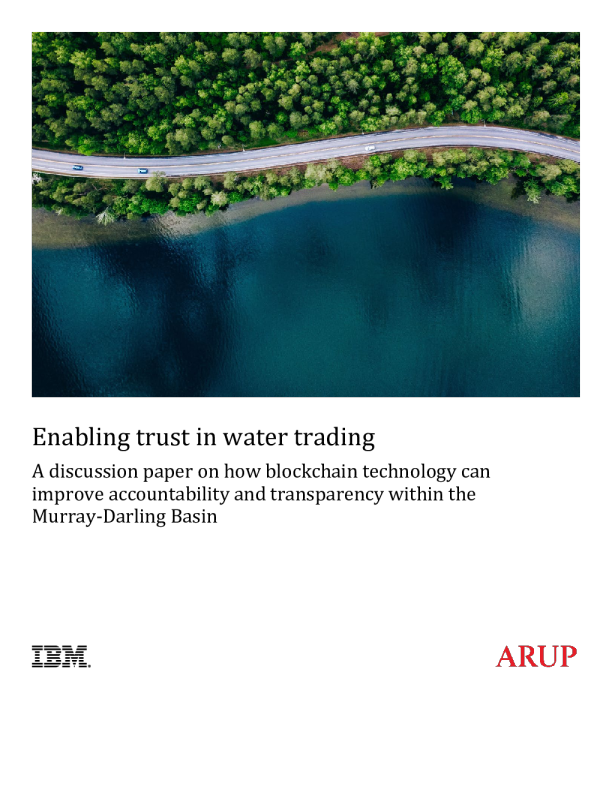赋能水交易中的信任
 AI智能总结
AI智能总结
关于区块链技术如何提高墨累-达令盆地内问责制和透明度的讨论论文 目录 03摘要05未来挑战概述:墨累-达令盆地水市场概览06我们的观察07什么是区块链技术?09水市场改革路线图和建议16提升多边开发银行(MDB)市场架构案例研究 1: 17启用Equigy进行可再生能源电网管理,改善贸易流程和信息18 案例研究 2: 20确保食品安全与透明度 —— 通过IBM Food Trust实现信任 —— 阿鲁普21DPE的研究201823引领变革之道24信任-赋能的企业平台,作为维护生态完整性的催化剂案例研究3:25推广可持续发展及通过塑料银行支持地方社区,通过降低塑料浪费实现。26结论 一个区块链赋能的水平台,旨在提高澳大利亚水市场的责任感和透明度。 引言 奥雅纳和IBM联合开发了这篇讨论报告,探讨了区块链技术如何提升澳大利亚水资源交易市场的问责性和信任。这基于两份重要报告的发布——2021年3月26日澳大利亚竞争与消费者委员会(ACCC)发布的《水市场调查报告》以及2022年10月11日气候变化、能源、环境和水务部(DCCEEW)发布的《水市场最终路线图报告》。此外,奥雅纳还与行业领军企业合作,研究了替代贸易模式,以解决两份报告中提出的建议。这些建议旨在应对在默里-达令盆地(MDB)水资源交易市场中已被识别的一些挑战。 适当的可访问性以及交易的不可变性。这样一个平台必须能够应对不可避免的复杂性,并足够灵活,以考虑未来的交易模式以及现有和新约束的层级。一个由区块链架构管理的安全可信的水资源交易平台1利用去中心化数据提供商、物联网(IoT)和智能计量,将有助于 将澳大利亚定位为世界水资源管理领域的领导者。这可以是一个单一的“水平台”,所有与支持我们环境和经济相关的用水都可以被所有相关利益相关者访问和跟踪,并以透明的方式管理,以在水资源自然可用范围内实现各方同意的目标。 尽管被认为是世界领先的,澳大利亚水市场,特别是墨累-达令盆地(MDB)的水交易市场,却承受着一个老旧的数字交易架构的负担,该架构复杂、信息不完整,最重要的是,无法为用户提供足够的对交易平台的信任。那些市场调查的参与者承认,这导致了缺乏透明度、低效和失去的机会。 尽管如此,已经具备了创建一个行业领先的水市场平台的基础;该平台能够实时捕捉交易,从而确保信息的完整性。 通过与行业的互动,我们对利益相关者所面临的挑战有深刻的理解。2然而,我们也观察到澳大利亚在全球范围内引领建立行业范围内的综合性水市场平台的独特地位。为此,本讨论稿概述了一个去中心化、协作平台的概念,旨在解决上述主要报告中提出的关键问题。我们的观点是赋能人们获取水资源,提高市场透明度,并在生态系统管理中重建信任。 在讨论区块链赋能的水交易平台优势的同时,这份讨论文件提供了其他行业中区块链解决方案解决传统方法失败挑战的案例研究。这些案例研究支持了我们对于区块链赋能水交易平台的观点,证明了提供此类解决方案具有实际价值。 我们的讨论稿确定了以下四个政策领域的改革,以确保水市场具有完整性保障,并使参与者能够获取信息,以便做出明智的交易决策: 1. 诚信与透明度 2. 数据与系统 市场架构 4.治理。 发现 未来挑战:澳大利亚竞争与消费者委员会对墨累-达令盆地水市场的调查 1. 水市场存在重大缺陷,MDwater市场极为复杂。结果是相当的不确定性和增高的主权风险。调查发现: – 市场信息是分散的、不完整的,既不及时也不全面。– 水市场中介的监管最少,导致灌溉户的混淆和利益冲突。– 随着供水和需求的变化以及市场的发展,市场架构正承受越来越多的压力。– 相结合,市场缺陷导致市场内部公平性的丧失。 本节旨在提供一个当前状况的高级概述,这一状况源自历史决策,本质上已经加剧了我们今天所看到的一些问题和低效。 水市场在复杂程度和交易活动方面持续演变。澳大利亚在这一领域一直处于先锋地位,其早期成功引入了水交易。澳大利亚已成为世界领先的农村水市场管理和运营国家。然而,反映政治现实而非水资源现实的复杂治理安排,以及缺乏透明度的零散系统限制了进步。这些观察结果由澳大利亚竞争与消费者委员会(ACCC)的最终报告得到强调(ACCC报告的发现和建议分别总结在表1和表2中)。 2. 投资者与农业企业交易 澳大利亚竞争与消费者委员会(ACCC)密切审查了4家大型投资者、4家小型投资者和11家主要农业企业的交易行为。 – 大型投资者持有南连盆地7%的高可靠性/安全权益。– 2018-19年间,大型及小型投资者占购买分配量的11%,占售出量的21%。– 2018-19年间,主要农业企业购买了分配量交易的25%,在2019-20年上半年的交易中占比38%。 澳大利亚水管理的演变可以追溯到1914年的墨累-达令河流域水协议。其中最显著的变化发生在20世纪80年代,当时首次引入了水交易。墨累-达令河流域的水交易在不同地区以不同的时间开始,以便在同一山谷内的灌溉者通过交易最大化水资源的生产性使用,并有助于管理和减轻水资源冲击的影响。 3.监管不足和市场透明度缺失 澳大利亚竞争与消费者委员会(ACCC)未发现投资者行使了市场力量或操纵价格。 调查发现: – 在无法获取或未记录的情况下进行监管非常困难。– 公共数据的缺乏导致公众对某些概念产生误解、错误信息,以及普遍的市场信心不足。– 目前尚无单一实体负责对盆地内的交易进行持续有效的监控。 水交易是一个复杂的市场,其中水经纪人在有限透明度的情况下完成水交易。交易涉及农民、灌溉者、城镇和政府,以满足分配的多样化需求。山谷内的交易允许灌溉者建立具有弹性的生态系统,并促进社区的成功。基于先前水交易的成功,水交易市场已经发展成为墨累-达令流域(MDB)更广泛的水管理改革组成部分。 表1——ACCC最终报告的总结性发现 尽管这些早期成功,但国家和联邦政府的现代角色和责任,以及跨区域发展银行内部各州边界法律的不一致及其相关执行,导致了市场低效率。3 ACCC调查的结果总结于表1中。 基于这些发现,澳大利亚消费者委员会(ACCC)提出了一些建议。这些建议在报告中得到了广泛报道,并在表2中总结为四个关键领域。 3. 系统问题也会导致市场低效。有些人可能会辩称:法律与执行的不一致性是一个问题,但不是那么多的效率问题。一个,而是一个透明度和不平等问题。透明度/平台和信息获取对于小型企业和大企业来说也是一个问题(或许)。指出在可能的情况下,根本不需要经纪人的立场。 建议 我们的观察 1. 交易流程与信息 – 数字解决方案以提升贸易流程和互操作性。– 改进跨区域贸易流程。– 实施共同的水市场数据标准。– 创建一个面向公众的水市场信息平台,包括贸易信息和市场公告。– 制定一个水市场教育项目。 某些建议需要政策及立法变更以满足,这不可避免地将导致时间线的延长以及需要政府间协议。 然而,在短期内,有几种实际可行的措施可以实施,以开发一个符合以下建议的水交易平台解决方案:透明化、简化的市场架构;改善的交易流程;清晰的报告;以及适当的市况公告。 2. 缺乏监管和市场透明度 — 建立一个以以下内容为重点的水市场机构:— 市场监管和监督 — 市场信息 — 市场评估 — 市场咨询和倡导 — 制定建议,要求水市场机构提供以协助决策所需的要求。— 提高多边发展银行理事会和委员会的角色透明度。 overtime, such a water platform will serve as a basis to address in time the other reforms proposed in the ACCC final report. 3. 市场完整性 — 集中的、流域广域市场竞争与诚信立法,包括对中介机构的强制性行业规范。— 完备的报告要求和数字化支持市场监察。— 市场公告的标准化规则和流程。 每次交易发生时,它被记录为“区块”数据。 什么是区块链技术? 这些交易显示了有形(产品)或无形(知识产权)资产的流动。数据块可以记录您所需的信息:谁、什么、何时、何地、多少,甚至包括食品运输的条件,如温度等。 区块链是一个共享的、不可更改的账本,它促进了在商业网络中记录交易和跟踪资产的过程。资产可以是有形的(如房屋、汽车、现金、土地)或无形的(如知识产权、专利、版权、品牌)。几乎任何有价值的东西都可以在区块链网络上进行追踪和交易,从而降低所有参与者的风险和成本[参见图1]。 每个区块都与它之前和之后的区块相连 这些区块形成一个数据链,当资产从一个地方转移到另一个地方或所有权发生变更时。这些区块确认了交易的确切时间和顺序,并安全地将区块连接在一起,以防止任何区块被修改或在两个现有区块之间插入另一个区块。 交易被锁定在一个不可逆的链条中:一个区块链 每个额外的区块都加强了先前区块的验证,从而确保整个区块链的安全。这使得区块链篡改痕迹明显,展现了不可变性的关键优势。这消除了恶意行为者篡改的可能性,并建立了一本您可以和其他网络成员信赖的交易账本。 区块链为什么重要:商业信息竞赛 分布式账本技术 所有网络参与者都可以访问分布式账本及其不可篡改的交易记录。通过这个共享账本,交易仅记录一次,消除了传统商务网络中常见的重复劳动。 越快收到并且越准确,越好。区块链是传递这种信息的理想工具,因为它提供即时、共享且完全透明的信息,这些信息存储在不可篡改的账本上,只有获授权的网络成员才能访问。区块链网络可以追踪订单、支付、账户、生产等更多内容。由于成员共享单一的真实视角,您可以从头到尾查看交易的所有细节,这给您带来更大的信心,同时也带来了新的效率和机会[参见图2]。 不可变记录 未经记录到共享账本中的交易,任何参与者都不能更改或篡改。如果交易记录包含错误,必须添加一个新的交易来撤销错误,然后两个交易都将可见。 智能合约 为了加速交易,一组被称为智能合约的规则被存储在区块链上并自动执行。智能合约可以定义企业债券转让的条件,包括支付旅行保险的条款等等。 图2——区块链的关键要素 更大的信任 区块链的益处。 使用区块链,作为仅限成员的网络成员,您可以放心,您将收到准确和及时的数据,并且您的机密区块链记录将仅与您特别授予访问权限的网络成员共享。 区块链的益处源自于优化商业操作中诸如重复和第三方验证等低效率需求。记录系统可能容易遭受欺诈和网络攻击。有限的透明度可能会减缓数据验证,随着物联网的到来,交易量急剧增加。所有这些都减缓了业务,侵蚀了利润——这意味着我们需要一种更好的方法。进入区块链[参见图3]。 更高的安全性 对于所有网络成员的一致性,需要验证数据准确性,而且所有经过验证的交易都是不可变的,因为它们被永久记录。没有人,甚至系统管理员都不能删除交易。 更多效率 在分布式账本中,网络成员共享信息,从而消除了耗时耗力的记录核对。为了加速交易,一套称为智能合约的规则可以存储在区块链上并自动执行。 图3—区块链的益处4 路线图改革建议 下表详细列出了DCCEEW《水市场改革路线图报告》中的建议,这些建议与Arup&IBM的主张直接一致,即基于区块链的水交易平台能够为ACCC《水市场调查报告》中确定的问题提供解决方案。 以下表格中确定的推荐意见将由水交易平台直接服务。我们认为,路线图中未出现在表格中的推荐点与拟议的水交易平台解决方案不符。在我们提出将我们的建议向前推进的建议中,我们认为,Lower Darling、Wimmera/Mallee和南澳大利亚Murray流域将提供对这项技术最稳健的测试,因为它是跨管辖区的。此外,它还提供了在通用水交易平台环境中展示不同交易规则的最佳方式[参见表3]。 市场架构 提升默里-达令盆地市场架构 – 提高分配决策的透明度,并沟通管理短缺的计划。– 制定稳健的周转和储存损失核算。– 加强计量和监控,并改善使用、交付和贸易的建模。– 完善区间交易机制,消除“反应最快的手指”优势。– 明确环境水的交付




